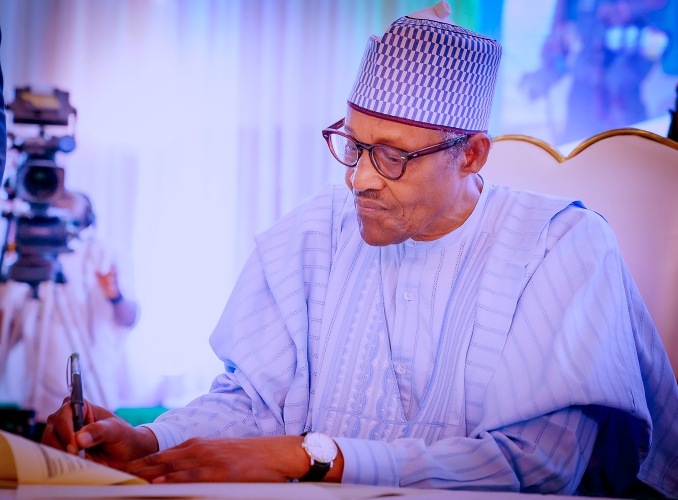By Chioma Obinagwam
Fitch Ratings, an award-winning provider of credit ratings, commentary and research, has downgraded Nigeria’s Long-Term Foreign-Currency Issuer Default Rating (IDR) to ‘B-‘ from ‘B’.
Confiance News gathered from the website of Fitch on Friday.
It, however, noted that the outlook for the country is stable.
‘B’ ratings denote weak prospects for ongoing viability. Material failure risk is present, but a limited margin of safety remains. The institution’s capacity for continued unsupported operation is vulnerable to deterioration in the business and economic environment.
The rating company also listed key rating drivers which include:
High Debt Service Drives Downgrade: The downgrade to ‘B-‘ reflects continued deterioration in Nigeria’s government debt servicing costs and external liquidity despite high oil prices in 2022. Low oil production and the expensive subsidy on petrol have consumed most of the fiscal benefit of high oil prices in 2022 and will continue to stress already low government revenue levels. If implemented, subsidy reduction in 2023 would benefit public finances, but constrained oil production and structurally low domestic non-oil revenue mobilisation will limit potential gains.
High Cost of Fuel Subsidy: Fitch expects that the implicit subsidy on petrol will cost the government approximately NGN5 trillion (2.4% of GDP) in foregone revenue from the Nigerian National Petroleum Corporation (NNPC) in 2022, which will contribute to a widening of the general government (GG) fiscal deficit to 6.1% of GDP. The foregone revenue stems from the spread between the regulated pump price of petrol, which has averaged NGN190 per litre, and the import cost, which has averaged above NGN300 per litre. The Petroleum Industry Act 2021 contains language mandating a move to a market price for refined fuel products, but plans to phase out the subsidy in 2022 were pushed back owing to higher global oil prices.
In 2023, our base case scenario sees a gradual narrowing of the spread between the pump price and true market price of petrol, which is in line with the government’s proposed 2023 budget. However, a we expect a longer timeframe for completely phasing out the subsidy, and therefore a higher level of foregone revenue. Moreover, the February 2023 election will bring a new administration, which will likely introduce a supplemental budget. Although the subsidy reform has broad-based political support, Fitch considers that there will likely be public pressure to continue the fuel subsidy. Lower subsidy costs and a marginal improvement in oil production, will narrow the GG fiscal deficit, but we expect the this to remain above 5% of GDP in 2023.
Cost of Debt Spiking: Fitch forecasts Nigeria’s GG debt to increase to 34% of GDP by end-2022. This includes the Federal Government of Nigeria’s (FGN) overdraft with the Central Bank of Nigeria (CBN). Nigeria’s debt stock is low compared with the forecast 2022 ‘B’ median of 57.6% of GDP. However, its debt servicing metrics are among the highest for Fitch-rated sovereigns. We forecast government debt/revenue to increase to 580% in 2022 and interest/revenue to reach 47.7%, compared with the current ‘B’ medians of 282% and 10.8%, respectively. Both ratios will remain at broadly the same levels in 2023 before falling slightly in 2024.
At the central government level, Nigeria’s debt metrics are made worse because the FGN holds a higher percentage of GG debt relative to its share of GG revenue. Interest payments reached 108% of FGN revenues in 1H22.
Stagnant Oil Production: Nigeria’s oil production will continue to be weighed down by the combination of oil theft, pipeline vandalism, and aging infrastructure. This will limit both GDP growth and government revenue performance. Production levels have been on a downward trend for several years and, after averaging 1.6 mbpd in 2021, fell to 1.2 mbpd in September 2022. We forecast 2022 crude oil production, including condensate, to average 1.3 mbpd and increase slightly to 1.4 mbpd in 2023. Fitch believes that the February 2023 general election will increase security risks in the oil-producing regions, but that the coming back online of the Forcardos export terminal and the Trans-Niger pipeline could help to offset continued losses from theft and vandalism.
Foreign-currency Liquidity Pressures: Higher oil prices have brought an improvement in oil export receipts; although some of this has been offset by higher fuel imports. We forecast the current account to move into a small surplus in 2022, from a deficit of 0.4% in 2021.
Despite the improvement in the current account, Fitch forecasts reserves to end 2022 at USD36.3 billion, down from USD40.2 billion in 2021, and to continue falling in 2023-2024. Falling reserves levels have contributed to tight foreign-currency liquidity, as evidenced by the rapid depreciation in the parallel market rate, which was NGN855/USD on 8 November as compared with the official rate of NGN446/USD. The inability to reliably source US dollars on the official FX market has in turn contributed to lower portfolio inflows, which will continue to put further pressure on foreign-currency liquidity.
The ‘B-‘ Long-Term Foreign-Currency IDR also reflects the following factors:
Manageable Near-term External Debt Service: We estimate that the government faces external debt amortisations of USD2.4 billion in 2023 and USD2.7 billion in 2024, which will be met through a combination of reserves drawdown and new external borrowing, most likely syndicated loans. We forecast total external debt service to reach 11.8% of current external receipts in 2022, which is lower than the ‘B’ median forecast of 18.6%. The Ministry of Finance has clarified that a statement made by the Minister in October did not signal Nigeria’s intention to seek a debt restructuring. While the statement reflects the increasing pressure on debt affordability, Fitch does not consider a debt restructuring or forced debt exchange likely in the near term.
Growth in the service sectors will continue to support GDP growth, which Fitch forecasts at 3.0% in 2022 and 3.1% in 2023. In 2021, Nigeria returned to positive real GDP per capita growth after five years of negative per capita growth. Despite higher interest rates and tight foreign-currency liquidity, Nigerian banks have increased credit provision to the private sector, by 19.4% year-on-year in September 2022, compared with 14.1% in September 2021. Banks’ asset quality has also improved in 2022, with non-performing loans falling to 4.8% in August after averaging 6% in 2021.
High Inflation: Nigeria’s already high structural inflation has been aggravated by global commodity price spikes and supply constraints. Annualised inflation reached a 17-year high point of 20.8% in October2022. Fitch forecasts inflation to average 19% in 2022 and fall only moderately to 17.8% in 2023. By comparison, the ‘B’ median is 8.5%. The CBN raised the monetary policy rate three times by a total 450bp in 2022 and has used the cash reserve ratio to periodically remove liquidity from the domestic banking sector. Further monetary tightening brings downside risks to both the GDP growth outlook as well as the government’s domestic borrowing costs.
ESG – Governance: Nigeria has an ESG Relevance Score (RS) of ‘5’ for both Political Stability and Rights and for the Rule of Law, Institutional and Regulatory Quality and Control of Corruption. Theses scores reflect the high weight that the World Bank Governance Indicators (WBGI) have in our proprietary SRM. Nigeria has a low WBGI ranking at 17.2, reflecting weak institutional capacity, uneven application of the rule of law and a high level of corruption.








Leave a comment